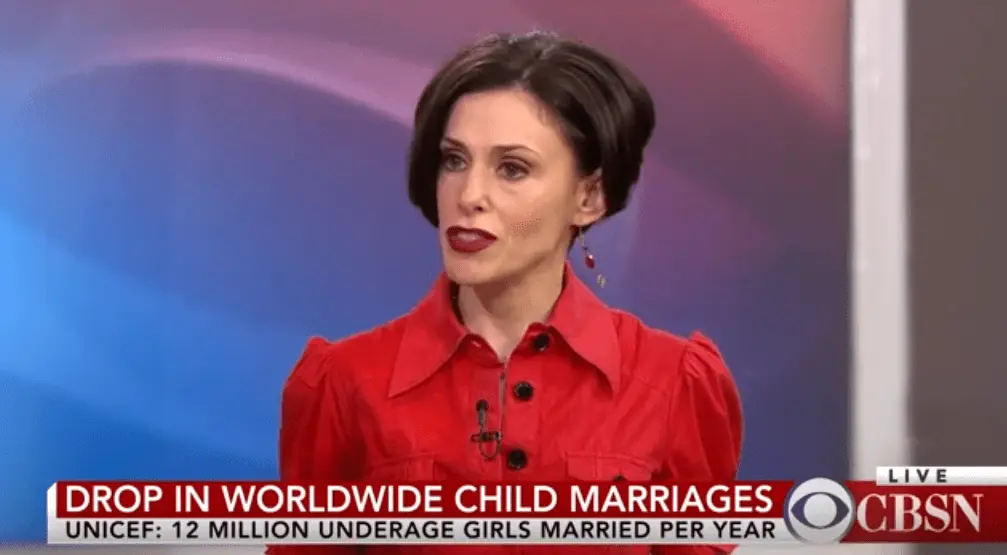
A recent UNICEF report shows the global rate of child marriage has dropped — but we cannot become complacent, Unchained’s Fraidy Reiss told CBSN today in a live interview. Child marriage remains legal, and still happening at an alarming rate, across the U.S., Reiss pointed out.
Watch the full segment here.
Sherry Johnson was raped when she was 9, gave birth when she was 10 and was forced to marry her rapist when she was 11. Sherry was married right here, in the US.
Nearly 250,000 children were wed in the US between 2000 and 2010, as Renate van der Zee explained in an article for The Guardian. “Almost all were girls married to adult men,” our executive director, Fraidy Reiss, told van der Zee.
Both houses of the Florida legislature should pass a bill to set the minimum age of marriage at 18, with no exceptions, the Florida Coalition to End Child Marriage said today. The coalition, which consists of 13 organizations including Unchained At Last, as well as survivors of child and forced marriage, called on legislators in the Florida House of Representatives to remove a harmful amendment from a pending law to ban child marriage.
On January 31, 2018, the Florida Senate unanimously passed SB 140, which sets the age of marriage at 18 with no exceptions. On February 1, an identical bill, HB335, was reviewed in the House Judiciary Committee. This committee amended the bill to permit the marriage of a pregnant 16- or 17-year-old, with parental consent and limiting the age difference of the spouses to two years. The members of the Florida Coalition to End Child Marriage are calling on all House members to instead pass the original version of the bill, setting the age of marriage at 18 without exceptions.
“I don’t want a single other child in Florida to go through what I did,” said Sherry Johnson, a member of the coalition who has been campaigning for several years to change the law. Johnson was forced to marry at age 11, in Pinellas County, under the current law, to a man who had raped her repeatedly and fathered her child when she was 10 years old. “I believe this is the year that we will end child marriage in Florida. The Senate has already passed a bill that would protect all children, and I am asking the House to do the same.”
A 16 or 17-year-old is still a child, without the rights of an adult and an adult’s ability to withstand pressure to marry against their will. Pregnancy does not change that. In addition, limiting the age gap between a married child and her spouse does nothing to prevent most of the harm associated with child marriage.
A growing body of research demonstrates that child marriage is associated with, and in some cases causes, severe harm to married children, wherever they live. A 2010 study found that girls or young women in the US who married before the age of 19 were 50 percent more likely to drop out of high school than their unmarried counterparts, and only 25 percent as likely to complete college.
Girls who marry as early teens–before age 16–in the US are 31 percent more likely to end up in poverty later in life. Girls who marry while pregnant are more likely to have a second child soon after, compared with girls who become parents but do not marry. A closely spaced second birth is associated with lower economic and educational attainment.
From 2000 to 2015, over 16,400 children below age 18 married in Florida. Eighty percent of these children were underage girls who married adult men. Child marriages are often forced or coerced by parents. Florida law currently permits children to marry at age 16 or 17 with permission from their parents, and allows a child of any age to marry in the event of pregnancy if a judge authorizes the marriage.
Globally, one out of every four girls marries before age 18, and 15 million girls marry before age 18 each year. The rate of child marriage is dropping, but population increases mean the numbers are increasing. Child marriage occurs in every region of the world. The overwhelming majority of married children are girls, most of whom marry older men sometimes much older.
Researchers have found significant associations between child marriage and mental and physical health disorders. One study found that marrying as a teenager in the US was associated with a 23 percent higher risk of disease onset—including both physical and mental health conditions–for women. Research from other countries shows a correlation between child marriage and domestic violence. Married girls often find it more difficult than married women to escape an abusive or unhappy marriage and to access services such as shelter and legal assistance.
The Senate bill was sponsored by Senator Lizbeth Benacquisto. The House bill is sponsored by Representative Jeanette Nunez.
New York, Texas and Virginia have all passed laws in recent years aimed at reducing child marriage. Germany, the Netherlands, and Sweden are among numerous other countries taking similar steps. Florida has been a leader in protecting the rights of children; if the Senate bill becomes law, it would make Florida the first state to completely ban child marriage.
The Florida Coalition to End Child Marriage includes the following organizations: AHA Foundation, Children’s Campaign, Delores Barr Weaver Policy Center, Florida Chapter of American Academy of Pediatrics, Florida International University Center for Women’s and Gender Studies, Human Rights Watch, Jewish Women’s Foundation of the Greater Palm Beaches, Minority Outreach Solutions, National Organization for Women, Sherry Johnson, Southern Strategy Group, Surly Feminists for the Revolution, Unchained At Last, and Zonta Club of Pinellas County.
“I am so grateful to every member of the Florida legislature who has taken the time to hear my story and care about this issue,” Johnson said. “I want to thank every senator who voted for the bill, and all the members of the House who have voted for it in committee. We are so close to getting this done, and I just want to ask, from the bottom of my heart, for legislators to go the whole way and end all child marriage in Florida.”
For more information, contact Fraidy Reiss: fraidy@unchainedatlast.org or (908) 481-4673.
Just in case we at Unchained At Last weren’t bringing enough attention to forced and child marriage in America, our founder/executive director, Fraidy Reiss, has another trick planned.
She’s going to give a TEDx Talk on April 14.
TED is a nonprofit organization dedicated to “ideas worth spreading,” and TEDx is a program of independently organized, TED-like conferences where TED Talks video and live speakers spark deep discussion and connection.
TEDxFoggyBottom 2018, on the campus of George Washington University in Washington, DC, is expected to draw more than 1,500 people. And, of course, Fraidy’s talk – and the talks of the other speakers at the all-day conference – will be posted afterward on the TEDx Talks YouTube channel, which boasts more than 10.7 million subscribers.
The theme of TEDxFoggyBottom 2018 is Fear Itself. Fraidy will talk about the fear she experienced when she was pressured at 19 to marry a man she barely knew who turned out to be violent, and how she overcame that fear to escape her marriage, even though her family shunned her for it. She’ll talk about the fear that forced and child marriage survivors across the U.S. experience every day, and what Americans can do to end these human rights abuses that many people assume do not happen in the U.S.
Purchase TEDxFoggyBottom tickets here.
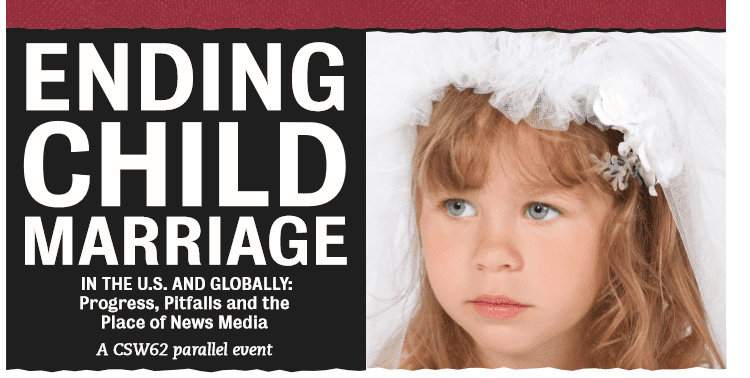 Hosted by Unchained At Last
Hosted by Unchained At Last
on the first day of the 62nd session
of the Commission on the Status of Women
at the United Nations headquarters in New York
We at Unchained At Last recently got special consultative status with the U.N. Economic and Social Council — and we’re already using it to make some noise.
Please join us for Ending Child Marriage in the U.S. and Globally: Progress, Pitfalls and the Place of News Media. This is a CSW62 parallel event, scheduled to coincide with the first day of the 62nd session of the Commission on the Status of Women at the United Nations headquarters in New York City.
Date: March 12, 2018
Time: 2:30 P.M. – 4:00 P.M.
Location: Salvation Army Auditorium
221 E. 52 Street
New York City
Speakers:
Carly Figueroa – Senior Producer, NowThis (MODERATOR)
Liesl Gerntholtz – Executive Director of Women’s Rights Division, Human Rights Watch
Fatima Hamed – Child Marriage Survivor
Fraidy Reiss – Founder/Executive Director, Unchained At Last
Respondent: Alexandra Still – Research Assistant, Hoover Institution
Questions? Contact Unchained.
Do you have any idea how much we at Unchained At Last accomplished in 2017 to combat forced and child marriage in America, with your help?
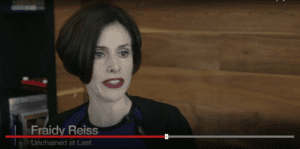 You helped us to focus national and international media attention on child marriage in America. The op-ed article we wrote about child marriage in America, published in the Washington Post in February, grabbed some 1 million hits. It was one of the most-read articles on the WaPo website for a couple of days. And we also wrote op-ed articles for CNN.com, Thomson Reuters, Star-Ledger and Nicholas Kristof’s New York Times blog.
You helped us to focus national and international media attention on child marriage in America. The op-ed article we wrote about child marriage in America, published in the Washington Post in February, grabbed some 1 million hits. It was one of the most-read articles on the WaPo website for a couple of days. And we also wrote op-ed articles for CNN.com, Thomson Reuters, Star-Ledger and Nicholas Kristof’s New York Times blog.
Nicholas Kristof shined a spotlight on our work, for the New York Times, Samantha Bee did the same for Full Frontal. We appeared on BBC (radio in January, and television in October), CBS, PBS (online) and Public Radio International.
In December, Forbes named our founder, Fraidy Reiss, one of Five Fearless Female Founders to Follow in 2018.
 You helped us to provide crucial, often life-saving legal and social services – always for free – to more than 175 women and girls to help them flee or resist a forced marriage in America.
You helped us to provide crucial, often life-saving legal and social services – always for free – to more than 175 women and girls to help them flee or resist a forced marriage in America.
One of those women and girls was Mariam (not her real name or photo), whose parents tried to force her into marriage when she was 17. She turned to us for help, but helping her seemed impossible: We could face kidnapping charges if we rescued her, because she was not yet a legal adult, and the domestic-violence shelter in her county refused to accept her for the same reason.
So we coached Mariam to convince her parents to delay the marriage for a few months, until after she graduated from high school and turned 18. During those tense months, Mariam checked in with us daily by texting us an ever-changing code word. We knew what to do if we did not get the right code: Immediately send the police. And as soon as she graduated from high school, we helped Mariam to leave home and move onto a college campus where she is now in her sophomore year, single, safe and happy.
We still check in with Mariam regularly and send her the occasional care package – she has become part of our family – but we no longer need to use a code word.
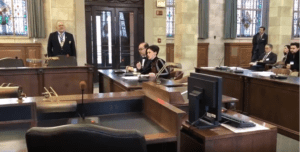 You helped us to expand the growing national movement we started, to end child marriage in America by fighting to pass legislation in all 50 states and at the federal level.
You helped us to expand the growing national movement we started, to end child marriage in America by fighting to pass legislation in all 50 states and at the federal level.
After we shocked the nation with an op-ed article in the New York Times in 2015 showing child marriage was legal in all 50 states, we followed up in February with an op-ed article in the Washington Post that revealed the horrifying extent of America’s child-marriage problem: An estimated quarter-million children, at least as young as 12, were married here between 2000 and 2010 – mostly girls to adult men.
We recruited allies, built grassroots support and worked with legislators across the US to expand the national movement this year. We came THIS close to ending child marriage in New Jersey, before Gov. Chris Christie, America’s most hated governor, conditionally vetoed the bill in May. We’ll try again in the upcoming legislative session, under the new and improved governor there.
We also helped to write and/or promote strong legislation now pending in Florida, Massachusetts, Pennsylvania and Arizona. We’re working to improve a bill pending in Ohio. And we helped to write and/or promote strong legislation that flopped in California (where it’s been amended into a dangerous bill), New Hampshire (where it was defeated) and Maryland (where it died for the second time and is about to be re-introduced). We tried, unsuccessfully, to improve bills that passed in New York, Connecticut and Texas that limit child marriage but do not end it. And we are working with federal legislators too.
We thank the law firm White & Case for making this important work possible by conducting extensive pro bono legal research. And we thank the lobbying firm Brownstein Hyatt Farber Schreck for taking on this project, at the federal level and in some states, on a pro bono basis.
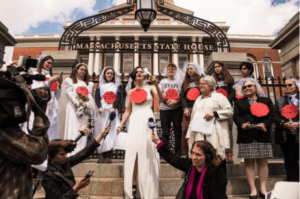 You helped us to organize four Chain-Ins, a unique form of protest we invented, where participants wear bridal gowns and veils, with chains on their wrist and tape on their mouths, to show the world what life looks like for girls in America who are forced to marry.
You helped us to organize four Chain-Ins, a unique form of protest we invented, where participants wear bridal gowns and veils, with chains on their wrist and tape on their mouths, to show the world what life looks like for girls in America who are forced to marry.
Some 120 people joined the Chain-In, in three states, drawing significant media attention to the problem of child marriage in America and to the legislation Unchained has written to solve the problem.
Join our e-mail list to be sure you know about Unchained’s next Chain-In.
 You helped us to reach some 1,660 people at conferences and other events in the US and the UK. The conferences included the global Trust Conference in London, where Reiss shocked the international audience by showing that forced and child marriage are pervasive problems in the US.
You helped us to reach some 1,660 people at conferences and other events in the US and the UK. The conferences included the global Trust Conference in London, where Reiss shocked the international audience by showing that forced and child marriage are pervasive problems in the US.
 You helped us to win prestigious awards and recognition this year: The TrustLaw Impact Award, presented in London to us and White & Case for our work to end child marriage. Kean University’s Outstanding Human Rights Community Activist Award, presented to Reiss. And the United Nations Economic and Social Council granted us special consultative status, giving us access to influence and raise awareness of forced and child marriage among key international decision makers.
You helped us to win prestigious awards and recognition this year: The TrustLaw Impact Award, presented in London to us and White & Case for our work to end child marriage. Kean University’s Outstanding Human Rights Community Activist Award, presented to Reiss. And the United Nations Economic and Social Council granted us special consultative status, giving us access to influence and raise awareness of forced and child marriage among key international decision makers.
 You helped us to raise more than half a million dollars this year and to more than triple the size of our team. We began the year with two employees and 500 volunteers. We head into 2018 with four full-time paid staffers, a puppy named Logan (a service dog in training), two consultants, one part-time staffer and more than 650 volunteers.
You helped us to raise more than half a million dollars this year and to more than triple the size of our team. We began the year with two employees and 500 volunteers. We head into 2018 with four full-time paid staffers, a puppy named Logan (a service dog in training), two consultants, one part-time staffer and more than 650 volunteers.
Let’s keep up our important work. In 2018, let’s serve even more women and girls who are fleeing forced marriages. Let’s keep expanding the national movement to end child marriage in America, state by state, by introducing even more laws and organizing more Chain-Ins.
Please keep doing what you’ve been doing:
Forbes today named Unchained’s founder/executive director, Fraidy Reiss, one of Five Fearless Female Founders to Follow in 2018.
In a piece about five women who are tackling some of the world’s “most urgent issues,” Forbes recognized Fraidy’s fierce leadership in the national movement to end forced and child marriage in America – after she escaped her own forced marriage.
“Reiss doesn’t want the same thing to happen to anyone else,” the article explained. “So, she started the nonprofit Unchained At Last.”
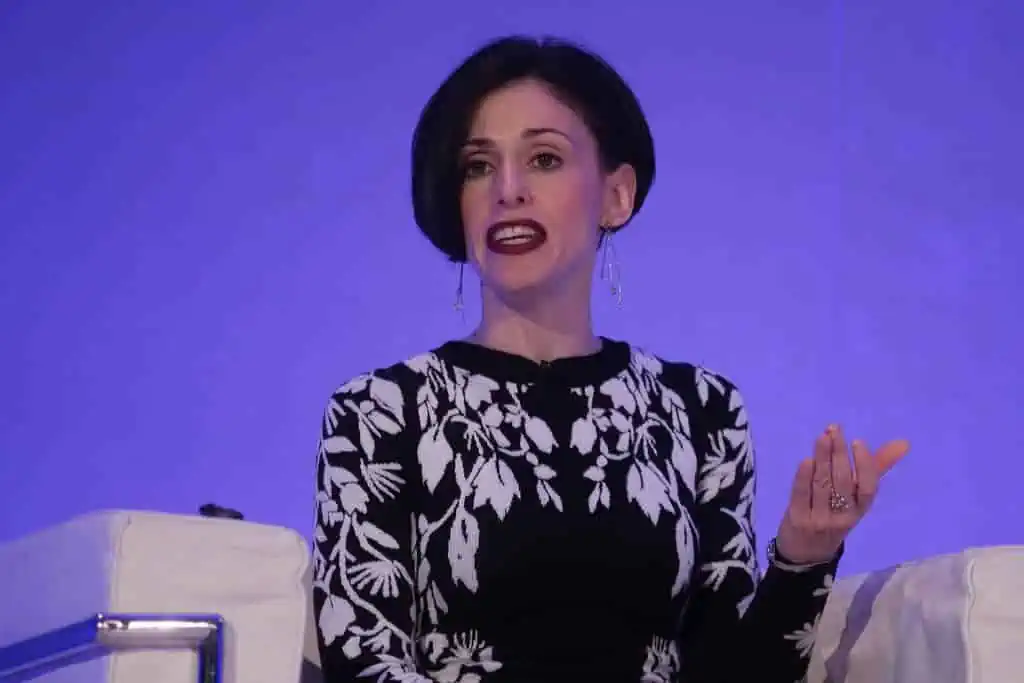
Unchained’s founder/executive director, Fraidy Reiss, spoke today at the global Trust Conference in London, where she joined a discussion on why progress on women’s rights has stagnated worldwide. She explained how her own forced-marriage experience inspired her to found Unchained – and, as often happens, surprised the audience by showing that forced and child marriage are pervasive problems in the US.
“Let me tell you what forced marriage in America looks like,” Reiss told the audience of some 650 people. “Let me tell you what child marriage in America looks like.”
The two-day conference, hosted by the Thomson Reuters Foundation, aimed to find real solutions to fight slavery, empower women and advance human rights worldwide.
Photo credits: Thomson Reuters Foundation, Fraidy Reiss
Some 30 attorneys attended today, as Unchained again gave its popular training course on family law, in partnership with Rutgers Institute for Professional Education. The course provided an overview of New Jersey matrimonial law, covering the major steps of the divorce process — from filing the complaint to addressing issues of equitable distribution, child custody, child support and alimony — with a focus on arranged/forced marriage and the legal and ethical issues involved.
*The course fee of $150 was waived for admitted attorneys who committed to representing an Unchained client pro bono as she flees from an arranged/forced marriage. (The course was worth 8 or more CLE credits in New Jersey and New York, and 6.5 credits in Pennsylvania.)
Unchained thanks the Jewish Women’s Foundation of New Jersey for the generous grant that made this CLE course possible.
Meanwhile, click here to apply to join Unchained’s team of Pro Bono Attorneys, which will allow you to take the course for free.
Why should attorneys donate their time?
Attorneys who commit to representing an Unchained client pro bono receive:
~ Free access to this training course, worth significant CLE credits in NJ, NY and PA ($150 value)
~ Experience in matrimonial law
~ Mentoring from an experienced matrimonial law attorney
~ Valuable networking opportunities
~ Hours of service toward exemption from mandatory pro bono assignments
~ Unchained funds for expert witnesses and other court-related fees
~ The chance to unchain a woman or a girl from a marriage she did not choose
Attorneys with 5+ years of matrimonial law experience also can take advantage of these opportunities:
~ Mentor another attorney (counts in New Jersey as hours of service toward exemption from mandatory pro bono assignments)
~ Present a portion of an upcoming Unchained CLE course (earns double CLE credits in New Jersey)
Could Florida soon become the first U.S. state to end child marriage?
We at Unchained At Last just got back from a three-day trip last week to Tallahassee with an impressive group we assembled called the Florida Coalition to End Child Marriage. We made noise: We met individually with some 40 legislators (in back-to-back meetings and in caught-you-in-the-hallway encounters), testified passionately at a senate judiciary committee hearing, held a lively press conference, and ate awful bagels at a Capitol cafe.
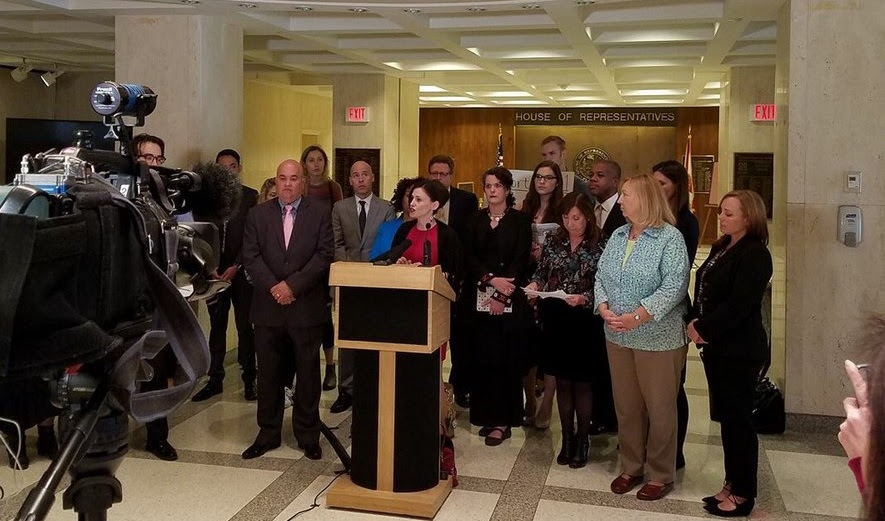 Our Fraidy Reiss leads a press conference in Tallahassee Oct. 25. Photo credit: Human Rights Watch
Our Fraidy Reiss leads a press conference in Tallahassee Oct. 25. Photo credit: Human Rights Watch
And we saw immediate results: Some 30 of the legislators we met promised to support the legislation. The senate judiciary committee unanimously approved the senate version of the bill, which now heads to several other legislative committees. No one got sick from the bagels.
Help us to seize on this momentum. If you’re in Florida – or any other U.S. state where we’ve helped to write legislation to end child marriage – take a minute now to email your legislators to show your support. And get everyone you know to do the same.
Also last week, our executive director, Fraidy Reiss, was featured in a BBC segment that aired around the world, titled “Why does the US have so many child brides?” Click on the image to watch the segment, which is less than 5 minutes long.
The marriage age in Florida is 18, but children as young as 16 may marry with parental “consent” (which often is parental “coercion”), and children of any age may marry if they are pregnant or have a child.
Under these dangerous loopholes, more than 16,000 children as young as 13 were married in Florida between 2000 and 2015. More than 80% were girls wed to adult men; in many cases, the marriage covered up what would otherwise be considered statutory rape.
By not specifying a minimum age for marriage, Florida’s current laws are similar to those in Iran, Saudi Arabia and Yemen. By allowing a pregnancy exception, which only 10 states still do, Florida puts rape survivors at risk of being forced to marry their rapist – as happened to Florida native Sherry Johnson when she was 11.
We at Unchained, along with the entire Florida Coalition to End Child Marriage, are pushing to eliminate these archaic loopholes and end child marriage in Florida through pending legislation (SB 140, HB 335 and HB 71). The ever-growing coalition of local, state, national and international groups includes:
Want to join? Contact us here and let us know.
Unchained is the only organization dedicated to helping women and girls in the U.S. to escape forced marriages, and the only organization dedicated to ending forced and child marriage in America. We at Unchained lead a growing national movement to end child marriage across America, not only in Florida.
Right now, marriage before 18 is legal in all 50 states. Most states set 18 as the minimum age, but laws in every state allow exceptions for those younger than 18 to marry. Laws in 25 states do not specify any minimum marriage age.
Our groundbreaking research showed that in just the 38 states that track marriage-age data, more than 167,000 children as young as 12 were married between 2000 and 2010 – mostly girls wed to adult men. Based on this data, we estimate that nearly a quarter-million children were married in the U.S. in that decade.
This is an urgent problem for two main reasons. First, children can easily be forced into marriage or forced to stay in a marriage before they become legal adults, which happens at 18 in most states. Children face overwhelming legal and practical barriers if they try to leave home, access a shelter, retain an attorney or bring a legal action. The girls who reach out to us for help typically end up trying to kill themselves when they learn of their limited options.
Second, the lifelong impacts of marriage before 18 on girls’ health, education and economic opportunities and overall quality of life are devastating enough that the U.S. State Department considers marriage before 18 a “human rights abuse.”
We are working to draft, introduce and pass legislation to eliminate this human-rights abuse, state by state. To build support for the legislation, we write op-eds in the Washington Post and other papers; host Chain-Ins to protest child marriage; give regular media interviews; and present at conferences and other venues.
We’re seeing progress. Bills like the ones in Florida that we’ve helped to write and/or are helping to pass, that would end or reduce child marriage, have been introduced in multiple states. So far, though, no state has passed a bill to end all marriage before 18, without exceptions.
Let’s work together to end child marriage in America:
Our work to end child marriage in America is made possible by generous supporters including: